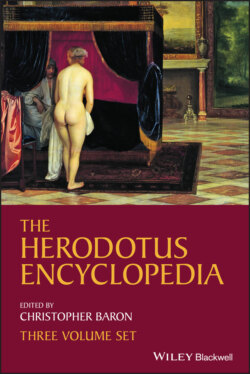Читать книгу The Herodotus Encyclopedia - Группа авторов - Страница 796
ASSEMBLY
ОглавлениеDAVID YATES
Millsaps College
Neither Herodotus nor the Greeks generally had a single fixed term for a political assembly. Herodotus uses ekklēsiē, haliē, agorē, and dēmos along with the names of the groups assembled. Assemblies appear as DECISION‐MAKING bodies across the Greek world: ATHENS (below), SAMOS (below), CYRENE (4.161), THEBES (5.79–80), and SPARTA (7.134.2). They are also present in the Near Eastern societies of Media (below) and PERSIA (1.125.2).
Herodotus presents a complex picture of assemblies (see, for example, Fornara 1971, 48–50; Van der Veen 1996, 99–103; Saxonhouse 1996, 31–57). At one end of the spectrum, they can be incredibly effective. On the eve of XERXES’ invasion in 480 BCE, the Athenians debate the meaning of a potentially ominous ORACLE in open assembly. Although the experts in oracular interpretation conclude that it advised flight, the Athenians choose rather to follow THEMISTOCLES’ more optimistic interpretation to resist by SEA (7.142–43). Herodotus then notes that on a previous occasion Themistocles persuaded the dēmos to invest in a fleet (7.144). Both decisions contribute directly to the Greek victory over Persia (7.139). On the other end of the spectrum, however, Herodotus’ assemblies are capable of immense folly. PEISISTRATUS tricks the Athenians into providing him with a bodyguard which he subsequently uses to seize control of the state (1.59.3–5). DEIOCES maneuvers the MEDES into making him king (1.97).
On several occasions Herodotus explicitly juxtaposes PRAISE and criticism for the capacity of popular assemblies to manage public business. In the CONSTITUTIONAL DEBATE, OTANES (1) commends the benefits of bringing decisions before the people (3.80.6) immediately before MEGABYXUS (1) (3.81.1–2) and Darius (3.82.4) accuse such popular assemblies of rank incompetence. MAEANDRIUS (II), the TYRANT of Samos, hopes to be thought the most just of men by handing power to the people and calls an assembly for that purpose, but during the meeting a prominent Samian demands he give an account of his rule. Maeandrius becomes frightened, the opportunity is lost, and Samos remains a tyranny (3.142–43). Later, Herodotus credits freedom of speech (isēgoriē) in the new Athenian DEMOCRACY with the meteoric rise of that state (5.78). But soon thereafter ARISTAGORAS (1), the tyrant of MILETUS, fools the assembly into contributing ships to the IONIAN REVOLT, a decision Herodotus calls “the beginning of evils for both Greeks and BARBARIANS” (5.97). King CLEOMENES of Sparta rejected the same offer earlier (5.50–51), and the contrast prompts Herodotus to observe that the whole of the assembly was easier to deceive than a single man (5.97.2).
Much work has been done on the Athenian assembly and the related concept of isēgoriē (see Saxenhouse 1996, 2006). For more on Greek assemblies generally, see the brief survey by Mitchell (2006, 370–73) or the more extensive treatment by Ruzé (1997).
SEE ALSO: Advisers; Deception; Freedom; polis
